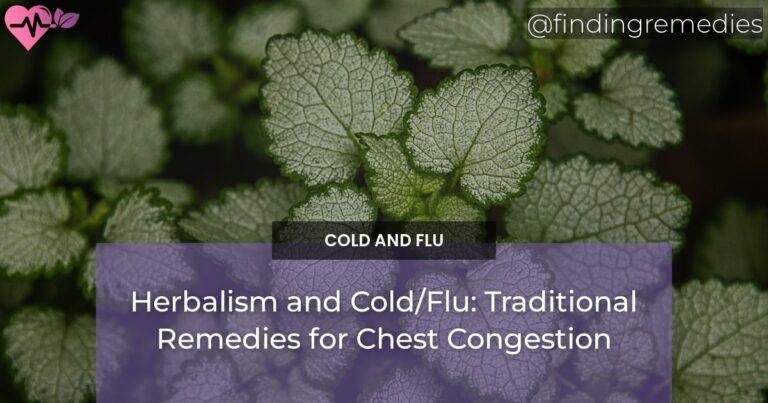For centuries, herbalism has been a trusted ally in the fight against various ailments, including chest congestion caused by cold and flu. By harnessing the power of natural remedies, individuals can find relief from discomfort, difficulty breathing, and persistent coughing without relying on harsh chemicals or medications. In this comprehensive guide, we will delve into the world of traditional herbal remedies, exploring their benefits, preparation methods, and potential interactions, to provide a natural and effective approach to tackling chest congestion.
Key Takeaways:
- Herbalism offers a range of natural remedies for chest congestion, including eucalyptus, peppermint, thyme, licorice root, mullein, marshmallow root, garlic, and ginger.
- Understanding the root cause of chest congestion is crucial in addressing the issue effectively.
- Preparing and using herbs can be done through various methods, including making herbal tea, using herbal steam inhalation, creating an herbal chest rub, and using an herbal compress.
- It is essential to be aware of potential interactions and side effects when using herbal remedies, especially for individuals taking medications or with underlying health conditions.
- Consulting with a healthcare provider is crucial before using herbal remedies, especially for pregnant, breastfeeding, or individuals with underlying health conditions.
Understanding Chest Congestion
Chest congestion is a common symptom of cold and flu, resulting from excess mucus in the lungs and airways. This can lead to discomfort, difficulty breathing, and persistent coughing. Chest congestion is often a result of inflammation in the respiratory tract due to a viral infection. It is essential to address chest congestion promptly, as it can lead to further complications such as bronchitis or pneumonia if left untreated.
Understanding the root cause of chest congestion is crucial in addressing the issue effectively. By identifying the underlying cause, individuals can tailor their treatment approach to address the specific needs of their body.
Traditional Herbal Remedies for Chest Congestion
Herbalism offers a variety of natural remedies for chest congestion, each with its unique benefits and characteristics. Some of the most commonly used herbs for chest congestion include:
Eucalyptus
Eucalyptus has powerful decongestant properties, making it an effective remedy for breaking up mucus and clearing the airways. Its active compound, eucalyptol, helps to relieve congestion and make breathing easier. Eucalyptus can be used in steam inhalation or as an herbal chest rub.
In addition to its decongestant properties, eucalyptus has anti-inflammatory properties, which can help reduce inflammation in the airways and alleviate discomfort.
Peppermint
Peppermint is known for its cooling and soothing properties, making it a popular choice for chest congestion. Its menthol content helps to open up the airways, relieve congestion, and ease breathing difficulties. Peppermint can be used in herbal tea or as an essential oil for steam inhalation.
Peppermint’s calming effects can also help to reduce stress and promote relaxation, which can be beneficial for individuals experiencing chest congestion.
Preparing and Using Herbs
There are various ways to prepare and use herbs for treating chest congestion. Some of the most common methods include:
ALSO READ
Making Herbal Tea
To make herbal tea, steep 1-2 tablespoons of dried herbs in hot water for 5-10 minutes. You can strain the herbs before drinking or leave them in the tea for added benefits. Drink the tea 2-3 times a day for relief from chest congestion.
| Herb | Preparation Method | Benefits |
|---|---|---|
| Eucalyptus | Steam Inhalation, Herbal Tea, or Chest Rub | Decongestant, Anti-inflammatory |
| Peppermint | Herbal Tea, Steam Inhalation, or Essential Oil | Cooling, Soothing, Decongestant |
| Thyme | Herbal Tea, Steam Inhalation, or Essential Oil | Natural Expectorant, Anti-inflammatory |
| Licorice Root | Herbal Tea, Chest Rub, or Essential Oil | Anti-inflammatory, Soothing |
Understanding the benefits and preparation methods of each herb can help individuals choose the most suitable remedies for their specific needs.
Potential Interactions and Side Effects
While herbal remedies are generally safe, it is essential to be aware of potential interactions and side effects.
Interactions with Medications
Some herbs may interact with certain medications, so it is crucial to consult your healthcare provider before using them if you are taking any prescription medications.
ALSO READ
Allergic Reactions
If you have allergies to certain plants or herbs, it is crucial to avoid using them, as they may cause allergic reactions.
Dosage and Safety Considerations
It is essential to follow recommended dosages when using herbal remedies and to always choose high-quality herbs from reputable sources. If you are pregnant, breastfeeding, or have any underlying health conditions, it is best to consult your healthcare provider before using herbal remedies for chest congestion.
Conclusion
Herbal remedies have been used for centuries to treat various ailments, including chest congestion caused by cold and flu. By understanding the root cause of chest congestion, learning how to prepare and use herbs, and being aware of potential interactions and side effects, individuals can find relief without relying on harsh chemicals or medications. With the right knowledge and care, herbalism can be a safe and effective way to treat chest congestion and promote overall wellness.
By incorporating herbal remedies into their treatment approach, individuals can take a proactive role in managing their health and promoting overall wellness. Remember to consult with a healthcare provider before using any herbal remedies, especially if you are taking medications or have underlying health conditions.
RELATED ARTICLES:

